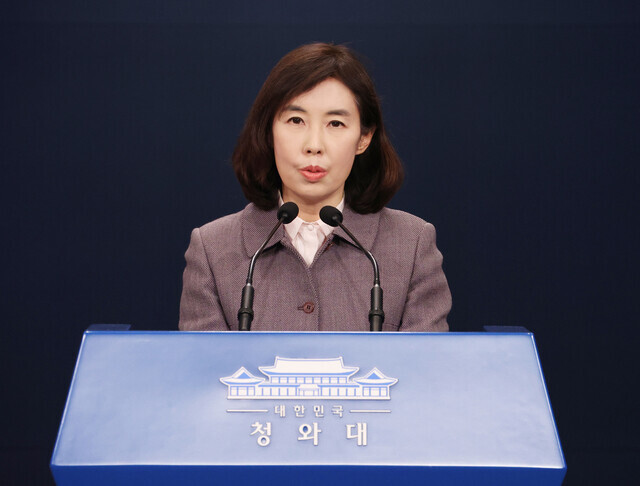hankyoreh
Links to other country sites 다른 나라 사이트 링크
No state funeral or flowers for Chun Doo-hwan: Blue House

South Korean President Moon Jae-in won’t be paying his respects at the wake for Chun Doo-hwan, nor will he be sending sympathy flowers. The Blue House noted that Chun’s family will be holding a private funeral and made clear the government won’t be covering the costs of the ceremony.
“We express our condolences for former President Chun Doo-hwan and express our sympathy to his bereaved family. We voice our regret that Chun never revealed the truth of history nor offered a sincere apology. The Blue House has no plans to send flowers or pay respects at his wake,” said Blue House spokesperson Park Kyung-mee during the press briefing on Tuesday afternoon.
The Blue House apparently opted to forgo such ceremonial gestures because of Chun’s refusal to cooperate in clearing up historical questions, such as denying responsibility for ordering troops to fire on civilians during the Gwangju Uprising; his failure to pay court-mandated restitution; and his complete lack of contrition for his past wrongdoings, such as slandering late Rev. Cho Pius in his memoir. There was a strong sense in the government that Chun shouldn’t enjoy the honors typically accorded to former presidents because he’d assailed the constitutional order by carrying out a military coup.
“The president’s intentions were conveyed in the briefing. I would draw your attention to the regret expressed about Chun’s refusal to offer a sincere apology or to cooperate in revealing the truth about the events during the Gwangju Uprising,” a senior Blue House official said. The official further explained that Moon held that Chun’s death shouldn’t be commemorated given his lack of contrition.
Those plans were adopted during a meeting of Blue House advisors around 2:30 pm, after Moon’s summit with Costa Rican President Carlos Alvarado Quesada, who was paying a state visit to Korea.
When former president Roh Tae-woo passed away in October, the Blue House communicated Moon’s condolences for the deceased and his sympathy for the bereaved family, while noting Roh’s checkered career — including the military coup on December 12, 1979, the suppression of the Gwangju Uprising in May 1980, the 1988 Olympics, Nordpolitik, and the adoption of a basic agreement with North Korea. Moon had sympathy flowers sent to the wake, and Chief of Staff Yoo Young-min and Senior Presidential Secretary for Political Affairs Rhee Cheol-hee paid their respects there.
Moon took a markedly different approach for Chun’s death, letting his spokesperson deliver the message of condolence and sympathy in his stead.
The government has also rejected the idea of giving Chun a state funeral or burying him in a national cemetery.
Min Jeong-ki, former Blue House secretary for public relations and a close associate of Chun’s, told reporters in front of Chun’s residence in the Yeonhui neighborhood of Seoul’s Seodaemun District that Chun had indicated before his death that he wanted to be cremated following a family funeral. Since Chun’s family wanted to hold a private funeral, the Blue House explained, there was no need to even discuss the public funding that would accompany a state funeral.
Rhee Cheol-hee, the political affairs secretary, had already written off that possibility during a debate over whether Roh should receive a state funeral. “I don’t think there’s the slightest merit to the idea of giving Chun Doo-hwan a state funeral or burying him in a national cemetery,” he said at the time.
By Lee Wan, staff reporter
Please direct questions or comments to [english@hani.co.kr]

Editorial・opinion
![[Editorial] Does Yoon think the Korean public is wrong? [Editorial] Does Yoon think the Korean public is wrong?](https://flexible.img.hani.co.kr/flexible/normal/500/300/imgdb/original/2024/0417/8517133419684774.jpg) [Editorial] Does Yoon think the Korean public is wrong?
[Editorial] Does Yoon think the Korean public is wrong?![[Editorial] As it bolsters its alliance with US, Japan must be accountable for past [Editorial] As it bolsters its alliance with US, Japan must be accountable for past](https://flexible.img.hani.co.kr/flexible/normal/500/300/imgdb/original/2024/0417/6817133413968321.jpg) [Editorial] As it bolsters its alliance with US, Japan must be accountable for past
[Editorial] As it bolsters its alliance with US, Japan must be accountable for past- [Guest essay] Amending the Constitution is Yoon’s key to leaving office in public’s good graces
- [Editorial] 10 years on, lessons of Sewol tragedy must never be forgotten
- [Column] A death blow to Korea’s prosecutor politics
- [Correspondent’s column] The US and the end of Japanese pacifism
- [Guest essay] How Korea turned its trainee doctors into monsters
- [Guest essay] As someone who helped forge Seoul-Moscow ties, their status today troubles me
- [Editorial] Koreans sent a loud and clear message to Yoon
- [Column] In Korea’s midterm elections, it’s time for accountability
Most viewed articles
- 1[Column] The clock is ticking for Korea’s first lady
- 2Samsung barricades office as unionized workers strike for better conditions
- 3[Editorial] When the choice is kids or career, Korea will never overcome birth rate woes
- 4S. Korea, Japan reaffirm commitment to strengthening trilateral ties with US
- 5[News analysis] After elections, prosecutorial reform will likely make legislative agenda
- 6Japan officially says compensation of Korean forced laborers isn’t its responsibility
- 7Why Israel isn’t hitting Iran with immediate retaliation
- 8[Editorial] As it bolsters its alliance with US, Japan must be accountable for past
- 9[Editorial] Does Yoon think the Korean public is wrong?
- 10[Guest essay] How Korea turned its trainee doctors into monsters